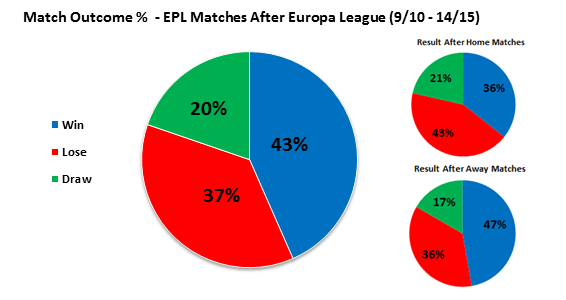By David Butler
Not for the first time this year the media has referred to Tottenham’s ‘Europa League hangover‘ as a cause of their poor domestic form. This week the Independent in England reported that this was "their fourth defeat at home this season in the league, with each failure coming after they have played in the Europa League midweek".
The theory goes that playing on a Thursday evening in the Europa League gives teams only a limited recovery time for a Sunday fixture and that a long journey back to England from remote European destinations can cause fatigue. So does playing in the Europa League cause poor domestic performance?
I collected data since the beginning of the Europa League competition in the 09-10 season for English teams that reached the group stages. Since the 09-10 season nine English clubs have played in the group stages of the competition; Tottenham, Manchester City, Fulham, Everton, Birmingham, Liverpool, Newcastle, Swansea and Stoke. Others have entered the competition but have failed to qualify for the group stages. English clubs have played 86 group stage matches to date. I also collected data on the 86 Premier League matches for these clubs for the Sunday after their Thursday European match (for the group stages only). I had to drop 10 observations from the sample as the teams competing in Europe played each other the following Sunday once and nine other times they didn’t play on the Sunday and had a longer rest period to their next domestic match. This left 76 matches that had a constant time gap between the Europa League and a domestic match.
As the pie-chart below shows, the clubs in the Europa League group stages have actually won more domestic matches following a Thursday night match than they have lost. There has been 33 wins, 28 loses and 15 draws on the following Sunday. The chart also breaks this down for matches played after home and away Europa League encounters. Interestingly, clubs have won more matches domestically having played away on a Thursday night than they have when they played at home. There may not be much in the ‘travel effect’ hypothesis.
While I only look at results after group stage matches and don’t control for the difficulty of a fixture or rotating squads, the moderate sample allows some insight to the ‘hangover’ phenomenon.
As Tottenham have played in the competition over the last four seasons they provide an interesting case. In the 2011-2012 season Tottenham actually collected maximum points in the six games after their Europa League group stage matches (18), beating the likes of Liverpool and Arsenal on Sundays. The exact opposite of a hangover! In 2012-2013 Tottenham won four of the six Premier League matches and lost two. In 2013-2014 they won two, drew one and lost three. This season they have lost all four so far.
Given this past success after Europa League matches one would really have to question the idea of a ‘hangover’ as a cause of Tottenham's home defeats after the Europa Cup this season. While the competition structure has remained constant over four years for the club, their human capital hasn't.
Why do some leap to the conclusion of a hangover effect? I think this is a case of an availability bias. We may be taking a mental shortcut, thinking the possibility of Tottenham losing on Sunday is higher simply because recent, and easy to remember, examples of Sunday losses following a Thursday match exist. When all the data is collected the shortcomings off relying on memorable matches becomes apparent.
Next I want to control for the factors mentioned above and I will look at individual teams and their post Thursday night points compared to their total points haul.

 RSS Feed
RSS Feed